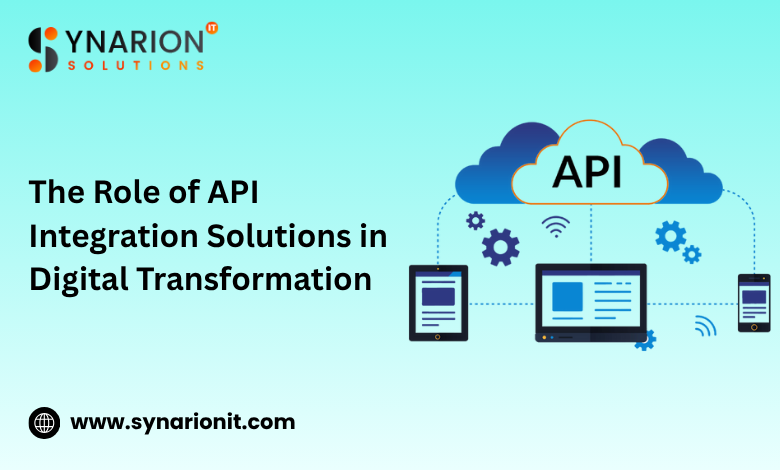In today’s rapidly evolving digital landscape, businesses across industries are undergoing significant transformations to meet rising customer expectations, streamline operations, and maintain a competitive edge. At the heart of this shift is the strategic use of technology to interconnect various systems and services, enabling seamless data flow and operational efficiency. This is where API integration solutions play a vital role. By enabling different software systems to communicate and work together, APIs have become the backbone of digital transformation.
What are API Integration Solutions?
API (Application Programming Interface) integration solutions refer to the set of processes and tools that connect software applications via their APIs. These solutions allow disparate systems—whether cloud-based, on-premises, or hybrid—to share data and functionality. For example, integrating a CRM system like Salesforce with a marketing automation platform such as HubSpot ensures that customer data flows automatically between both systems, leading to better customer engagement and analytics.
Unlike traditional point-to-point integrations, which can be complex and rigid, modern API integration solutions provide scalability, agility, and the ability to innovate faster. Whether it’s automating workflows, enhancing data accuracy, or enabling real-time information exchange, APIs are essential enablers of connected ecosystems.
Driving Digital Transformation Through APIs
Digital transformation involves adopting digital technology to create new—or modify existing—business processes, culture, and customer experiences. The goal is to meet changing market demands more effectively. API integration solutions support this transformation in several key ways:
System Interoperability
Many enterprises rely on a mix of legacy and modern applications. APIs enable these systems to work together without the need for complete overhauls. This interoperability is essential for maintaining continuity while introducing innovative technologies.
Faster Innovation and Time-to-Market
Businesses can quickly launch new digital services by integrating APIs from external providers. For instance, integrating a payment gateway API can instantly provide e-commerce platforms with secure payment processing capabilities. This reduces development time and allows businesses to respond quickly to market changes.
Data-Driven Decision Making
API integration solutions facilitate the seamless flow of data across an organization. When data is easily accessible and consistent across systems, organizations can harness advanced analytics and AI to gain actionable insights and drive smarter decisions.
Enhanced Customer Experience
With APIs, organizations can deliver more personalized, responsive, and cohesive customer experiences. For example, APIs can connect customer support systems with order management and inventory platforms, ensuring that support agents have all the information they need in real-time.
Scalability and Agility
As businesses grow and evolve, their technology stack needs to adapt. APIs offer a flexible way to scale services, add new features, or integrate additional tools without disrupting existing operations.
The Role of an API Development Company
While off-the-shelf API integration tools are available, organizations often require tailored solutions to meet specific needs. This is where an API development company becomes invaluable. These companies specialize in designing, developing, and managing custom APIs and integrations that align with a business’s digital strategy.
A professional API development company provides a wide range of services, including:
- Custom API Design and Development: Creating APIs that are secure, efficient, and tailored to business requirements.
- Third-Party API Integration: Connecting existing software systems to third-party services like payment processors, CRM systems, ERPs, and more.
- API Management: Implementing tools and policies to monitor API performance, manage access, and ensure security.
- Legacy System Modernization: Helping older systems communicate with new technologies through API gateways and wrappers.
- Compliance and Security: Ensuring that all integrations comply with industry regulations and best practices for data privacy and security.
Partnering with a skilled API development company ensures that integration projects are executed efficiently and align with long-term business goals.
Real-World Applications of API Integration
API integration solutions are being used across various sectors to drive digital innovation:
- Healthcare: APIs enable interoperability between electronic health records (EHR), lab systems, and telemedicine platforms, improving patient care and data accuracy.
- Finance: Banks use APIs for open banking, allowing customers to share their financial data securely with third-party services.
- Retail: APIs connect inventory systems with online storefronts, enabling real-time stock updates and order tracking.
- Manufacturing: Integration of IoT devices and ERP systems through APIs supports smart manufacturing and predictive maintenance.
Challenges and Considerations
While APIs offer significant advantages, organizations must also address several challenges:
- Security Risks: Improperly secured APIs can expose sensitive data. It’s essential to implement strong authentication, encryption, and monitoring.
- Versioning and Maintenance: APIs need to be regularly updated and maintained to ensure compatibility and performance.
- Complex Integration Scenarios: Some integrations may involve multiple systems and data formats, requiring expert handling and planning.
Conclusion
As digital transformation becomes imperative for businesses of all sizes, API integration solutions are playing an increasingly strategic role. They enable agility, innovation, and efficiency by connecting the digital dots across systems, teams, and customers. By working with a trusted API development company, organizations can unlock the full potential of their digital initiatives, ensuring seamless integration, robust performance, and secure operations. In a digital-first world, APIs are not just a technical component—they are a critical business enabler.



